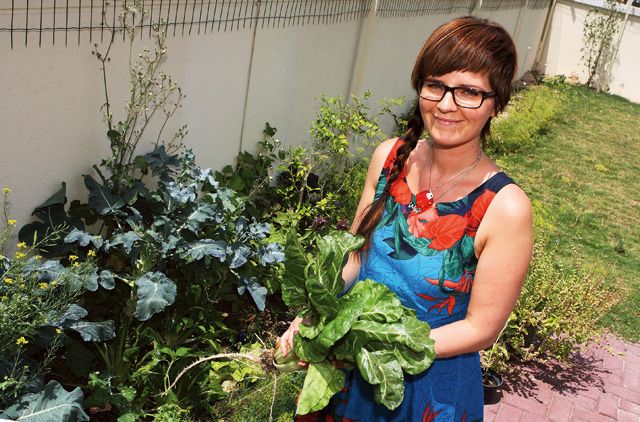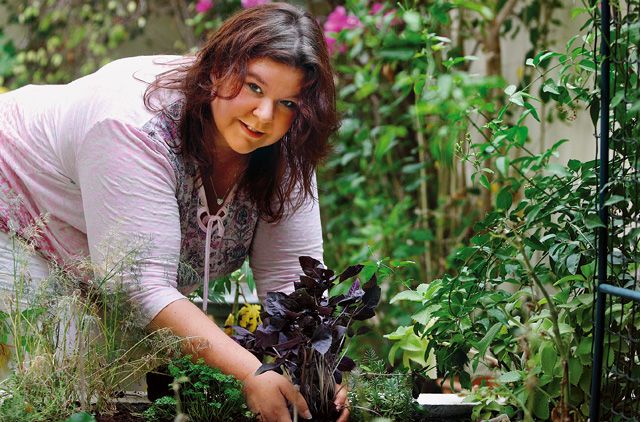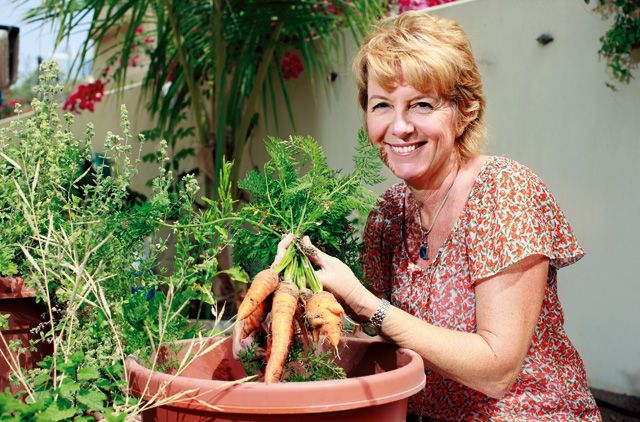Yes, it is sandy. Yes it is hot. But there are plenty of people having great success at growing their own fruits and vegetables in this sandpit - and many of them are not experienced gardeners, they're just ‘having a go'. People are growing everything from cucumbers and chilis to figs and mangoes, in their gardens, in pots, on their balconies and even sometimes in their bedrooms. What makes them do it? The thrll of eating something you have watched grow from a seed. The good, wholesome feeling you get from knowing that the food on your plate is organic. Oh, and the unbeatable taste.
But how do they go about it? We spoke to some industry experts and some homegrowing talents to get the lowdown on how to grow-your-own.
Excuse number one: We don't have a garden
Solution: Get creative
Proof: Hayley Ross Macdonald is the founder of Be Supernatural (besupernatural.com), an online store for raw, organic, ethically-sourced superfoods, servicing the UAE. Until she moved into a villa eight months ago, Hayley was growing all manner of fruits and vegetables on her balcony and in her apartment. She says, "We grew lots of veggies, like tomatoes, herbs and cucumbers on our balcony and we even grew stuff inside. We weren't sure if the plants would grow inside but we decided to try it and replaced all our indoor houseplants with veggie plants. They grew really well - we grew tomatoes, chilis, peppers and herbs inside, and we grew wheatgrass in cat litter trays which we stacked above each other in a cheap storage trolley on wheels from IKEA. Wheatgrass is really easy to grow, but you have to keep cats away from it as they love it."
If you're using pots, try brocolli, rocket, herbs, tomatoes, chilis and capsicum peppers.
Excuse number two: It takes too much time
Solution: It only takes as much time as you want it to take.
Proof: Jo Marengo is one half of the dynamic team which brought Bokashi (bokashidubai.com) home-composting bins to Dubai in 2009. She says, "Personally, I grow simply because I can… I enjoy it but, between running two companies and living a busy life, I don't have much time to spend on it. I just go with the flow. If something is doing well, I leave it. If it isn't doing well, I move it around until it's in a place where it is happier. This winter I've had tomatoes, bitter gourd, sweet potatoes, kale, radishes and carrots."
Excuse number three: It's too hot for anything to grow here.
Solution: Is it? Is it really?
Proof: James Balderstone and his wife Becky set up Ripe (ripeme.com), the weekly organic farmers' markets offering organic vegetable boxes, last year. As well as dealing with local organic farmers, James and Becky also grow their own vegetables at home. James says, "The UAE climate is great for growing vegetables and we see stuff doing well all year round out on the farms that we deal with. More and more UAE farmers are going organic and we are getting a good supply and variety of quality produce right through the year - so it is possible. Veggies that grow well in the winter include pumpkins, cucumbers, capsicum and chilis. In the spring time, eggplants, potatoes, zucchini and onions do well. Tomatoes and herbs do well most of the year, but may need protection from the sun over the summer."
Excuse number four: My garden is just sand. No amount of soil will make anything grow.
Solution: Make your own compost.
Proof: Jo says, "A lot of our Bokashi clients grow their own fruits and vegetables and we've seen a lot of people having a lot of success, especially over the last year or so. We get a lot of business from a group of people in the Greens who grow on their balconies and some schools are doing well with vegetable gardens using Bokashi, too." Hayley and Susan both swear by the power of Bokashi and put a lot of their growing success down to it. Hayley says, "Bokashi really makes a difference… I've seen dead plants come back to life just by being chucked into a pot with Bokashi. We were given two lemon trees for free from a garden shop because they were dead. When we got home, we put them in a pot with Bokashi and now they're thriving and we've had fruit off them. Also, you get little surprises from it when there's a seed in it which germinates and pops up into a plant you weren't expecting." Susan says, "Bokashi makes a huge difference… the soil here doesn't have any solid structure beneath it so it dries out very quickly. But Bokashi helps hold the water, as well as putting nutrients back into the soil. I find it so satisfying to be able to put anything going off in the fridge into the Bokashi bin and to know it isn't going to waste."
Excuse number five: I go away for the summer.
Solution: Close the patch down and wait for autumn.
Proof: Although some people manage to grow right through the summer, most hobby-gardeners leave their vegetable patches to rest over the summer period and start planting again the following autumn. Susan says, "Our garden goes to bed for the summer. We pull all our tomatoes out about April time and plant corn, which is great for cleaning the soil and getting rid of mildew. Over the summer, we dig Bokashi compost into the soil until it's time to start planting again." James says, "We grow our own vegetables at home, but we don't have the resources that the farms have, so many of our plants start dying off around the beginning of April and we'll leave it until after the summer before we plant again."
Excuse number six: You can buy organic now, so why bother?
Solution: Because you get more of a feel-good factor when you grow your own.
Proof: Susan says, "I've just grown pineapple for the first time… I cut the top off a pineapple and planted it in soil and it's grown, which is exciting. We've got oranges too, on a miniature orange tree that a friend gave me about seven years ago. The fruit's a bit bitter but it's good for marmalade. I don't think anybody grows to save money… you do it more for the satisfaction and for the taste. At Taste of Dubai I told Gary Rhodes that I'd made his famous white tomato soup and that I'd made it better than him. He looked shocked and asked me how. When I told him the tomatoes had come off my own plants he said that was cheating!" James says, "The great thing about growing your own fruits and vegetables is not only that they are organic and they taste better than the veggies you buy in the supermarket, but also that they haven't been shipped from the other side of the world. As soon as you pick something off a plant, the nutrition value starts decreasing. So, the longer the time between plant and plate, the less nutritious it is. At our Ripe markets, the produce is picked that morning and can be on your plate by lunchtime, which means it'll be still packed full of its nutrients. But when you can walk out in to your garden, pick a tomato off a plant and put it straight in your mouth - what could be better than that?"
Yes, it is sandy. Yes it is hot. But there are plenty of people having great success growing their own fruits and vegetables in this sandpit - and many of them are not experienced gardeners, they're just ‘having a go'. People are growing everything from cucumbers and chillies to figs and mangoes, in their gardens, in pots, on their balconies and even sometimes in their bedrooms. What makes them do it? The thrill of eating something you have watched grow from a seed. The good, wholesome feeling you get from knowing that the food on your plate is organic. Oh, and the unbeatable taste.
But how do they go about it? We spoke to some industry experts and some home-growing talents to get the lowdown on how to grow-your-own.
Get inspired
Still not convinced? Venture out to these two horticulturalist hotspots and speak to those in the know about how to kick off your vegetable patch.
Ripe Farmers' Markets (www.ripeme.com)
Head down to one of the Ripe weekly markets, held in both Dubai and Abu Dhabi, and pick the brains of Ripe founders, Becky and James. Not only do they know a lot about the types of vegetables that grow well in the UAE, the right times of year to plant, and how to get good results from organic growing, but you can bag yourself a box of fresh, organic goodies in the process. If the taste of their tomatoes doesn't inspire you to get growing, nothing will.
Jebel Ali Ali Golf Resort and Spa (www.jebelali-international.com)
Massimiliano Venturelli, aka Chef Max, is the culinary director and the driving force behind the resort's vast bio-garden. It started in 2006 with a few herb pots and has evolved into 1,000 square metres of land being used to grow tomatoes, peppers, cucumbers, beans, papayas, lettuces, eggplants, onions and more. Chef Max and his team have rigged up seeding houses with irrigation systems, so they can create a rainfall on the young plants and seedlings and are constantly experiementing with new vegetables and fruits. He says, "Right now, our bio-garden is supplying herbs to most of the 12 venues in the hotel and a lot of fruits and vegetables to La Traviata, our Italian restaurant, and La Fontana, our all-day-dining poolside restaurant. Working on the bio-garden is a team effort. All of the restaurant and kitchen staff - particularly chef Gawdat and chef Samir - are involved and we involve guests, too, by inviting children to come and plant a tree, which is labelled with their name. We are working towards being a fully sustainable hotel as we recycle the hotel's water waste and we recycle oil from the kitchens for biofuel. Also, we recycle waste from the kitchens to make our own organic compost for the farm. What I like most about the biogarden is that you feel you are connecting with nature. And you make kids realise that vegetables and fruits do not actually grow on shelves in the supermarkets." Take a visit to the resort and have a tour of the farming areas to get a sense of what can be achieved if you put your mind to it.
Golden growing tips
SUSAN "I'm a bit ‘new age' about it all and always plant on the full moon. When buying seeds, opt for Australian seeds rather than European seeds as they seem to be better suited to the climate. If you're growing in pots, make sure the pot doesn't overheat as it will cook the roots."
JO "I've grown all my plants from seed. First in seed trays, then to pots, and then to the ground."
HAYLEY "We keep the seeds from everything we eat. We dry them out and save them for planting. We're ending up with so many seeds that we are thinking of starting a seed exchange through Be Supernatural, so that the growing community can share their seeds with each other."
JAMES "There's not really a set time to plant the seeds - just when the heat dies down. But you can have a problem if you plant too soon because, if the heat spikes again, it can burn the seeds in the ground so they don't germinate."















